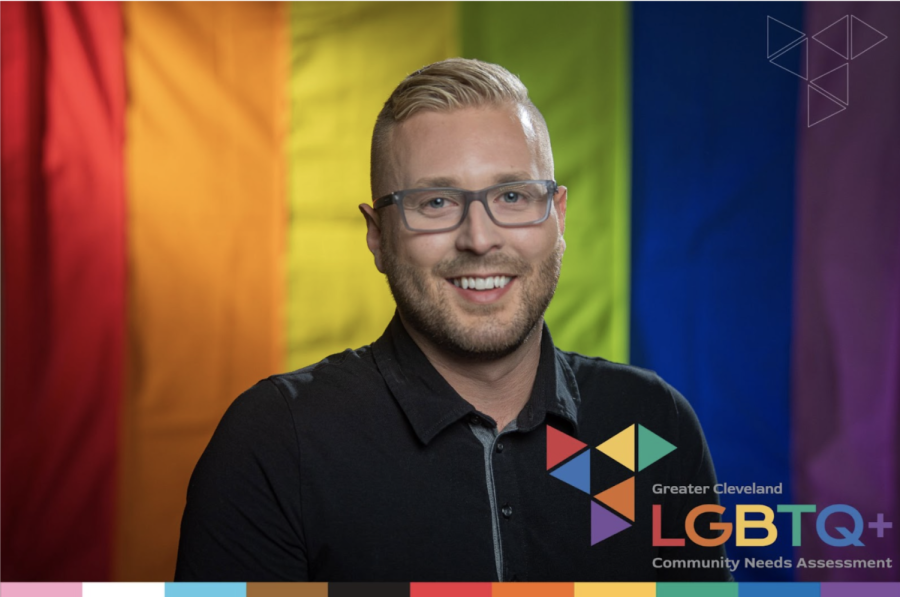Greater Cleveland LGBTQ+ Community Needs Assessment aims to improve lives of individuals
The College of Public Health is partnering with the LGBT Community Center of Greater Cleveland to conduct an LGBTQ+ community needs assessment. The project aims to improve the safety and lives of LGBTQ+ people in the area.
“We can’t sit around and wait for hospitals and health departments and government structures to listen in to what our needs are, let alone expect them to understand what our solutions to those problems would be,” primary investigator of the Greater Cleveland LGBTQ+ Needs Assessment Andrew Snyder said. “We are strong enough to come together and mobilize and organize to do this ourselves.”
As part of the assessment, the center will conduct surveys, hold focus groups and interview people in the community to identify the needs and struggles of LGBTQ+ individuals.
This assessment will be the second project of its kind headed by Snyder, who conducted a needs assessment for Greater Akron from 2020 to 2022.
The project leaders are expecting some similar results in the Cleveland project as in the Akron project. The Akron project experienced a large range of age diversity in its participants, with ages ranging from 18-88. Project leaders hope to replicate this in the Cleveland project. The Akron project also found that many participants were concerned with mental health, which project leaders believe will be the case with Cleveland as well. However, since Cleveland is a much larger city, they are also expecting several significant differences.
The team is hoping to have more diversity in race in the Cleveland study than in the Akron study.
“We’re not census tracked, so we don’t know how many queer people there are, let alone queer people of color or queer indigenous people,” Snyder said. “There was recently an article published postulating that around 30-40% of the LGBTQ community is made up by Black, indigenous or people of color. That’s where we’re kind of setting our benchmark in Cleveland. We’re hoping that at least 30% of those we engage with will be non-caucasian.”
Graduate assistant Le’Priya White emphasized the importance of diversity in their work.
“It’s my hope that we have a lot of different voices, a lot more POC. Just have a better hold on how intersectionality takes place and how that affects services,” White said. “Hopefully getting more local communities involved too. I’m excited for it.”
Snyder felt that it was important to have Cleveland-based LGBTQ+ people help him lead the project since he is not from the city. He is working alongside three graduate assistants who live in Cleveland on this project.
Graduate assistant Erin Washington spoke about the state of the LGBTQ+ community in Cleveland.
“I feel like we’re just a little more open in Cleveland, just because we do have a little bit more resources. So we’re a little bit more comfortable with expressing ourselves and letting people know exactly who we are,” Washington said.
The needs assessment will touch on many things that impact the LGBTQ+ community, including health, wellness, religion, spirituality, recreation, leisure, business, employment, commerce, education, literacy, law enforcement and safety.
“I just wanted to really invest that time into my community here and just really fight for my communities,” White said. “An experience of working with the LGBT community here in particular, I just see a lot of mixed reviews of how safe Cleveland is for them. I just want to genuinely make it a better place and advocate and just honestly learn from them.”
Since the beginning of January 2023, the team has been working every day, having meetings with community members and getting people and organizations involved in the project.
“Most everybody who impacts the project, whether it be in a big or small way, is doing it out of the kindness of their heart,” Snyder said. “I think a lot of it is because for so long, our community has been marginalized. We haven’t had an outlet to say what we need, let alone how we think those needs should be met.”
The needs assessment will officially begin in March. Project team members will meet with community members weekly during this planning period to answer important questions about the details of the project.
Data collection for the study will launch June 3 at Cleveland Pride. Comprehensive surveys will be conducted in the Cleveland area as the first stage of information gathering.
After the surveys are completed, the project will hold focus groups in the fall. These will help to provide the project leaders with a more qualitative view of their data.
“We call the focus groups ‘intersectionality focus groups’ because they’re at the intersection of queer identity and LGBTQ+ issues, concerns or problems,” Snyder said. “It doesn’t tell us how many people are experiencing this but it gives us a better understanding of what the experience is like.”
The third data collection method the project will use is stakeholder interviews. There are two types of interviews that the project will conduct in order to get a comprehensive look at the community. Some will be with heteronormative, or straight, people in the community, such as city officials or executives at big organizations, and others will be with members of the LGBTQ+ community, such as leaders of an LGBTQ center or similar organizations.
“I am part of an underrepresented group, so I personally understand how the system can look over certain people and basically not benefit everyone,” Washington said. “There’s still progress that needs to be made.”
The project is set to conclude December 2024. Snyder plans to start an LGBTQ+ needs assessment for the Youngstown area once the Cleveland study is complete.
“We’re just kind of slowly, piece by piece, putting this puzzle together. It’s a messy process, but it’s starting to come together,” Snyder said.
Addison Foreman is a reporter. Contact her at [email protected].
Addison is a junior journalism major minoring in creative writing and political science. She enjoys writing about politics, government and current events....


